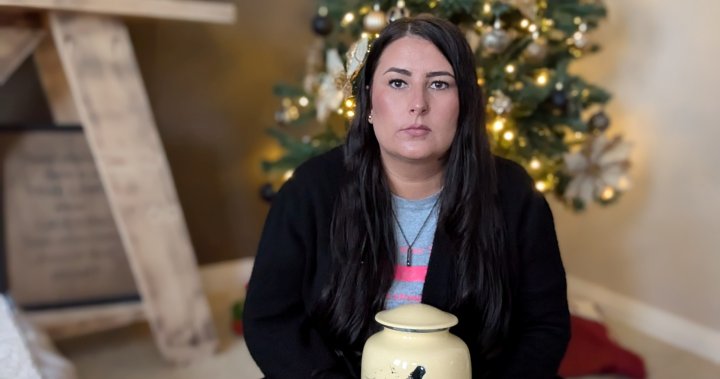The yellow urn, adorned with a delicate etching of birds in flight, serves as a poignant reminder of a life tragically cut short. For Brittanie Chabot, the urn holds the ashes of her mother, Marlene Fidler, a 57-year-old woman who lost her life in a traffic accident on October 4, 2024. The urn, a constant presence in Brittanie’s Lloydminster home, symbolizes the profound loss and the devastating void left in the wake of her mother’s sudden death. The weight of grief is palpable in Brittanie’s words as she expresses the immense sorrow that has enveloped her and her family. The urn, a vessel of memories and a symbol of what remains, serves as a tangible link to the mother she loved and lost.
Marlene Fidler’s story is one of struggle and hardship, marked by the relentless grip of addiction. At the time of the accident, Marlene was homeless, living in a tent along the Bow River in Calgary. Her descent into homelessness followed a period of profound personal tragedy, the sudden death of her son, Brittanie’s brother. The loss compounded her existing struggles with addiction, pushing her further into the margins of society and ultimately leading to her living in a makeshift camp along the river. Discovering her mother’s living conditions after her death was a heart-wrenching experience for Brittanie, adding another layer of pain to an already unbearable loss. The image of her mother’s meager belongings serves as a stark reminder of the harsh realities of homelessness and the devastating consequences of addiction.
Despite the challenges that marked their lives, Brittanie and Marlene shared a deep bond, a connection forged through years of separation and rekindled in adulthood. Brittanie, who grew up in Florida, moved back to Alberta in her twenties and reconnected with her mother fifteen years ago. This reunion filled a void in Brittanie’s life, providing her with the maternal figure she had long yearned for. The joy of reconnecting with her mother and finally having her in her life is evident in Brittanie’s words, even amidst the overwhelming grief of her loss. The memories of their reunion, of finally having that missing piece in her life, are now treasured keepsakes, offering solace amidst the pain.
A particularly poignant memory for Brittanie is a visit to her mother in the hospital last May. Unbeknownst to her at the time, this would be their final encounter. The significance of this visit is amplified by the fact that it was the first time Brittanie saw her mother sober. This brief glimpse of her mother’s true self, free from the clutches of addiction, is a treasured memory, a testament to the person Marlene could be. The bittersweet recollection of this visit underscores the profound loss and the unfulfilled potential of a life stolen too soon. The regret of not having more time with her mother, sober and present, is a recurring theme in Brittanie’s reflections.
The circumstances surrounding Marlene’s death add another layer of complexity to the tragedy. She was struck by a GMC pickup truck while walking back to her camp along the Bow River. While the driver remained at the scene and cooperated with authorities, the incident remains under investigation. Police have ruled out alcohol and speed as contributing factors on the part of the driver, and no charges have been filed. Despite the unanswered questions surrounding the accident, Brittanie’s focus remains on remembering her mother and ensuring that she is not defined by her struggles.
Brittanie’s plea is for her mother to be remembered as a human being, a person deserving of compassion and understanding, despite the challenges she faced. She emphasizes that her mother, despite her lifestyle, was a loved and cherished individual. She extends a message of understanding to the driver involved in the accident, acknowledging the emotional toll such an event can take. Her hope is that he can find peace and solace, recognizing the shared humanity in this tragic situation. Amidst her own grief, Brittanie demonstrates remarkable empathy, acknowledging the driver’s likely emotional burden. Her focus is not on blame or retribution but on remembering her mother and finding solace in the belief that she is now free from the pain of addiction and loss.










